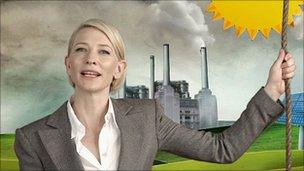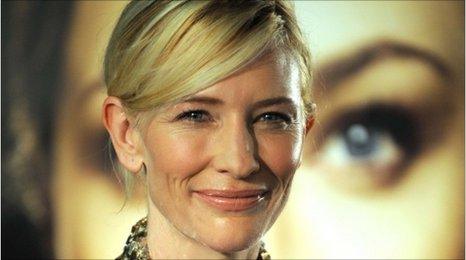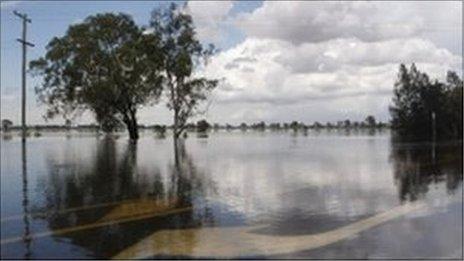The great 'Cate Debate'
- Published
- comments

Cate Blanchett has been criticised for appearing in a carbon tax TV advertisement
Raging since first thing Sunday morning, I dare say many of you will have already taken sides in the great Cate Debate.
For the uninitiated, Cate Blanchett, Australia's most luminous actress, has made a brief appearance in a television advertisement urging her compatriots to "Say Yes" to a carbon tax.
The response from opponents of the government's controversial proposal, who claim the tax will damage the Australian economy and hit ordinary Australians with increased bills, has been vituperative.
Nationals Senator Barnaby Joyce says the multi-millionaire star should stick to acting because she has no idea what it is like for working families struggling with rising costs.
Sydney's Sunday Telegraph backed up its banner front-page headline - $53m Hollywood superstar tells Aussie families to pay up - with a stinging editorial: "Cate Blanchett has proved she is just another morally vain Hollywood star trying to justify her great good fortune by preaching to the rest of us about climate change."
Tale of two actors
Ostensibly, this debate is about the environment and the economy but is also about the role of elites in Australian national life.
It has shades of the David Hicks row last week, where the "elites" were pitted against the "battlers". Indeed, as the culture wars flare again, the opposing sides have taken up their usual positions, like medieval armies in observance of ancient rites.
For non-Australians, it is important to understand the toxicity of word "elite". It operates in much the same way that the L-word "liberal" works in American politics. Thus, that five-letter word is loaded with extra meaning, and implies a progressive outlook in politics, a condescending view of battlers, a commitment to multi-culturalism, and, normally, a sense of unease about the more ignoble aspects of the country's history, including the treatment of the first Australians.
One of the central reasons that the Yes campaign in the Republican debate failed was because ditching the monarchy came to be seen as an "elite issue". Malcolm Turnbull, who was the head of that movement, struggled as leader of the Liberals because he was viewed as an elitist at a time when the Liberals have become a party of battler sensibilities.
Some have even argued that Cate Blanchett has damaged her own cause by backing it so publicly.
"One of the risks of any green campaign is that it appears like lefty, progressive, idealistic and elitist, detached from the struggles of everyday people," notes the advertising executive Adam Ferrier in The Australian.
But another actor, Michael Caton, appeared with Blanchett in the advertisement and has not received the same criticism. He is known to Australians as the star of the great battler movie, The Castle. That, apparently, has given him immunity in this debate. So, too, the role he plays in the popular drama series, Packed to the Rafters, where he burnishes his "ordinary Australian" credentials. Thus, he is harder to take on.
Without The Castle to protect her, Cate Blanchett is far more exposed when it comes to Australia's ongoing cultural wars.
- Published30 May 2011

- Published10 May 2011

- Published23 March 2011
- Published20 March 2011